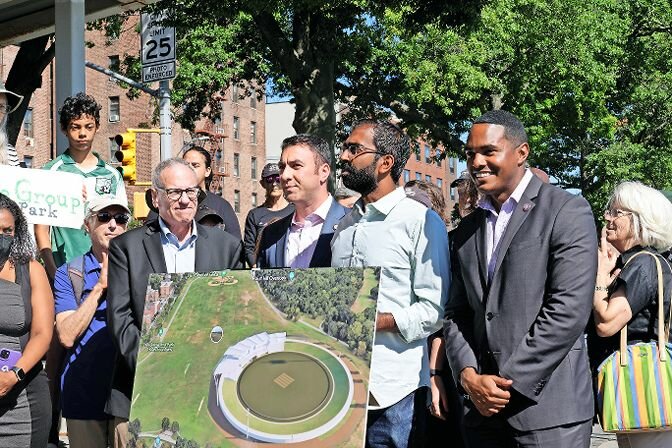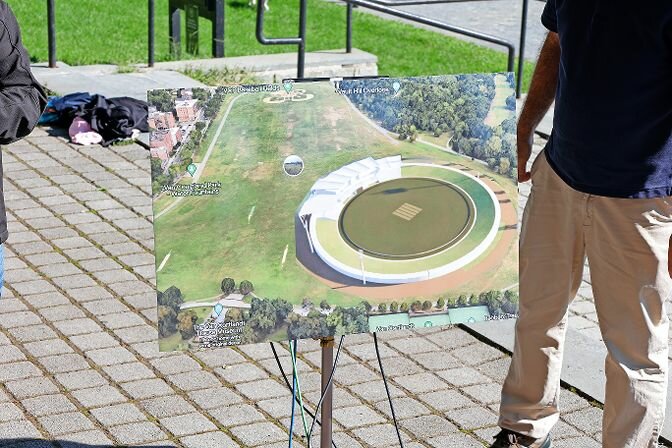Electeds band together to say 'no' to cricket stadium in Van Cortlandt Park
Torres, Dinowitzes take their concerns with mayor to the people and the press
Local electeds have once again joined together to voice their opposition to the Adams administration’s proposed construction of a 34,000-seat cricket stadium at Van Cortlandt Park.
Last Friday U.S. Rep. Ritchie Torres, Assemblyman Jeffrey Dinowitz, Councilman Eric Dinowitz, community organizations, and environmental organizations met at the park to send a crystal clear message to the city and Mayor Eric Adams.
“Van Cortlandt Park is one of the greatest parks in our city,” Torres said. “It is a citywide treasure. The local government cannot be allowed to desecrate one of the crown jewels of New York City. The International Cricket Council’s proposal for a massive cricket stadium cannot be allowed to stand.”
One of the qualms Torres and other elected officials had about the proposal was the lack of community engagement. The proposed cricket stadium has brought out concerns from community members about access to the park and damage to wildlife.
“We as a community feel blindsided,” Torres said. “And even betrayed, by the sheer suddenness of the city’s decision to construct a massive stadium in our local community in our local park without the barest attempt at community engagement.”
The proposed stadium on 20 acres of parade grounds of the park would close out parts of the park for up to six months. Construction would begin in January and end in June. The stadium would not be demolished until after the event in July. This schedule would gut the season of local cricket clubs that use the park.
Despite the lack of community engagement in the proposal, the community has been far from silent about the issue. Several cricket clubs and leagues have sent out a letter to Mayor Adams and Bronx Borough President Vanessa Gibson about their concerns.
In addition there was recently an open letter by the Bronx Council for Environmental Quality to New York City and state officials signed by a total of 29 groups and 144 individuals. There is also an online petition on ipetitions.com with about 750 people who oppose the stadium.
Torres spoke about how under the public trust doctrine no local government can deprive a community of public parks without getting approval of the state legislature. Under park alienation rules, the city must draft legislation to the state legislature, undergo an environmental review, and get approval from the city council.
“It cannot be the case that a local government can freely transfer massive amounts of public land to a private company for a prolonged period of time without any public process,” Torres said. “Without any environmental review, or public review, without any competitive procurements, or rezoning, without any public process at all. That simply cannot be the case.
“And if the city proceeds without a process it will set a dangerous precedent for every park in New York City. It will open the floodgates to the privatization of parkland.”
As far as the legislation being presented to the state legislature, Assemblyman Dinowitz has been pretty clear that he would not sponsor a bill allowing the stadium to be built, and would stand heavily opposed.
“We went through the horrible fight 20 years ago,” the Assemblyman said, “when the city muscled through this multi-billion dollar boondoggle on the other side of the park known as the Croton Water Filtration plant. It was a mess, it was a disaster. We’re not letting that experience happen again. This is the greatest park in the city.”
Councilman Dinowitz said they’ve been meeting with the administration about the issue for over two months. He says in all that time he’s had dozens of constituents come up to him everywhere he goes to tell him they think the proposal is a terrible idea. With other issues the park has had, the councilman questions how the city could pull off the stadium.
“We can’t even get ADA (Americans with Disabilities Act) compliant crosswalks on this block.” Councilman Dinowitz said.
“For over a month the bathroom in the mansion were without lights. And for a long time we have had security concerns, violence and quality of life issues, at Shandler Field, and the city has not properly dealt with it.
They can’t deal with ADA complaints, they could not deal with lights in the bathroom, and they could not deal with security at Shandler Field, and we expect that they’re going to be able to deal with over 34,000 people at our park?”
Nick Dembowski, director of the Van Cortlandt Museum, also shared his experiences with The Riverdale Press, saying that this summer the lack of electricity for weeks in the nature center and park resulted in no lights, no working toilets, and a complete blackout.
Councilman Dinowitz was not the only councilman present at the press conference. Councilman of the 25th District and Chair of the Parks Committee Shekar Krishnan came from Queens because of the citywide implications of the proposal.
“With the climate crisis we face now, with the public health crisis we face now,” Krishnan said. “We need to be doing so much more as a city to protect and preserve our park space. One thing that we’ve been clear on in the city council is that we as a city are behind many other cities across the country when it comes to investments in green space.”
Van Cortlandt Park Alliance deputy director Christina Taylor said the parade grounds is not a vacant lot, but a well-used and well-loved part of the community, such as for cricket, baseball, school trips, bird watchings, and to escape the stress of the city.
A tribal nation in New York and New Jersey has also shared concerns. Joel Kupferman, co-chair of the NGL Environmental Justice Committee and counsel to the Lenape nation, spoke on the behalf of Chief Dwaine Perry.
“I am concerned about this issue due to the connection between our nation and the lands which are now called Van Cortlandt Park,” Kupferman read from a statement. “Buried behind us, the parade grounds, was the site of a major Lenape village. Many people lived and worked the land, trails, and streets.”
Similar burial concerns were shared by Mary Jenkins, a Riverdale resident of 40 years who now lives at 6035 Broadway across the street from the park.
“The park is important to me personally,” Jenkins said, “because there are slave graves in this park. The Van Cortlandts owned slaves and as a matter of a fact the slaves dug Tibbets pond. So I am appalled that our mayor would want to take public land and sell it off.”
Ellie Sudbrock, president of the 6035 Broadway co-op board, told The Press everyone in the area is outraged about losing a place that has been good for the community’s health.
“The audacity of the mayor to think he can mess with us and take away this gem and this gift of life to us,” Sudbrock said. “That is really not going to happen because he’s going to find out that the Bronx people are strong people and we stand up for ourselves and we’re not going to let (him) walk on us.”
Deb Travis, Community Board 8 parks & recreation committee chair, said the board has invited the International Cricket Council to attend its September Committee meeting. As of yet, the council has not directly spoken to the board or public.
“I think of it as like, you know we can put a man on the moon if you’ve got the right plan,” Travis said. “But show me the plan for a 34,000-person temporary stadium and then we’ll tell you what’s possible and whether that will work in this community.”









